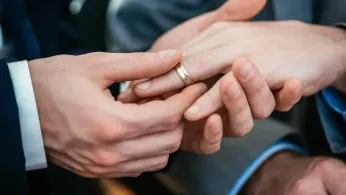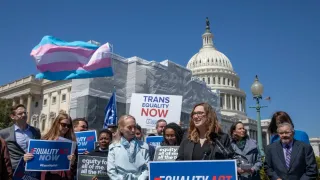
3 hours ago
Virginia Voters Poised to Decide Fate of Same-Sex Marriage Ban
READ TIME: 3 MIN.
In a landmark development for LGBTQ+ rights, Virginia is on the cusp of allowing voters to decide whether to remove a two-decade-old constitutional ban on same-sex marriage. The proposed amendment, which would also enshrine the right of couples to wed without regard to personal characteristics such as race or gender, has cleared a key legislative hurdle and could appear on the 2026 ballot if passed again during the next legislative session .
Virginia’s constitution has included a ban on same-sex marriage since 2006, when voters approved an amendment defining marriage exclusively as a union between one man and one woman. For nearly a decade, this provision reflected a broader national trend, with many states enacting similar bans .
That changed in 2015 when the U.S. Supreme Court’s Obergefell v. Hodges decision ushered in nation-wide marriage equality, rendering Virginia’s ban unenforceable . However, the ban has remained embedded in the state’s most fundamental legal document, continuing to symbolize exclusion for many LGBTQ+ Virginians.
Narissa Rahaman, executive director of Equality Virginia, described the 2006 amendment as a “stain on our state’s most revered document,” underscoring the importance of its removal for both legal clarity and symbolic affirmation of equality .
Advocates for marriage equality stress that repealing the state ban is now more urgent than ever. The Supreme Court’s 2022 decision overturning Roe v. Wade—another long-standing precedent—sent shockwaves through the legal community and prompted fears that marriage equality could also be at risk .
Justice Clarence Thomas’s suggestion that the Court reconsider its opinions protecting same-sex marriage has only heightened anxiety . If the Supreme Court were to overturn Obergefell, Virginia’s ban would once again become enforceable, immediately stripping same-sex couples of the right to marry in the state .
Virginia is one of 32 states with constitutional or statutory bans that could potentially be revived, making the outcome of this amendment especially significant for LGBTQ+ residents .
The proposed constitutional amendment, Senate Joint Resolution 249, seeks to repeal Section 15-A of Article I of the Virginia Constitution and explicitly prohibit the state from denying marriage licenses based on the sex, gender, or race of the applicants .
For an amendment to be placed on the ballot in Virginia, it must be approved by the General Assembly in two consecutive sessions with an intervening election. The current resolution passed the Democratic-controlled Senate, but its fate in the House of Delegates remains uncertain, as control of the chamber is highly contested .
Recent legislative votes have highlighted deep partisan divides. In the House, 35 members voted against the amendment, all Republicans, while only a handful abstained or were absent. Some Republican lawmakers have expressed concern that the amendment does not address the rights of religious authorities to decline to perform marriages, though state law already protects those rights .
If the amendment passes again in the 2026 legislative session, Virginia voters will face a historic choice: whether to permanently remove discriminatory language from the state constitution and affirm the right of all couples to marry. For many in the LGBTQ+ community, the vote is about more than legal rights—it is about dignity, recognition, and inclusion.
Advocacy groups such as Equality Virginia and the Human Rights Campaign have called for broad public support, emphasizing that marriage equality enjoys widespread backing among Virginians, with recent polls indicating majority support . Nonetheless, the outcome may hinge on voter turnout and continued engagement from allies and community members.
The proposed amendment would not just repeal the ban; by establishing an affirmative right to marry, it would ensure that marriage equality in Virginia is protected by the state constitution, regardless of future federal court decisions .
Virginia’s debate is part of a larger national reckoning as other states face similar choices. With marriage equality under renewed scrutiny in the courts and state legislatures, Virginia’s decision has the potential to influence both regional and national conversations about LGBTQ+ rights and the security of hard-won freedoms .






